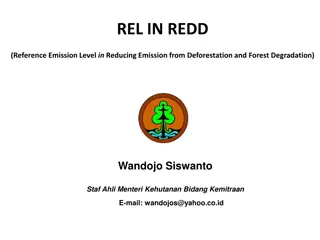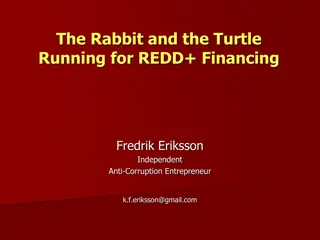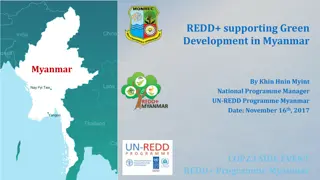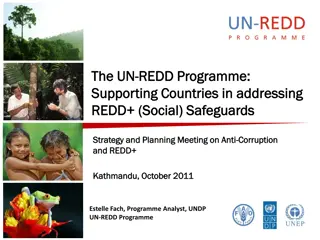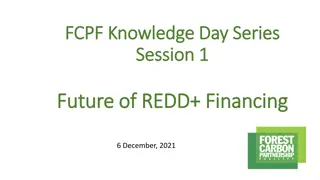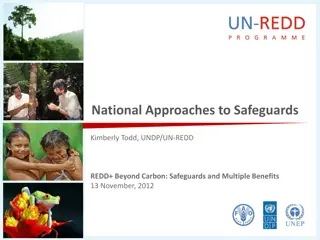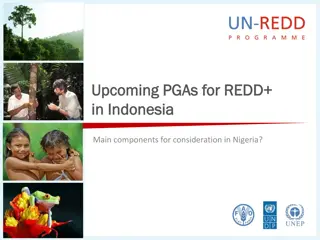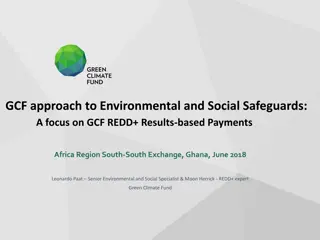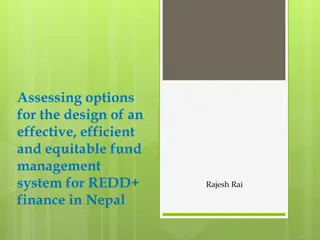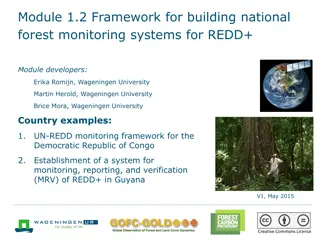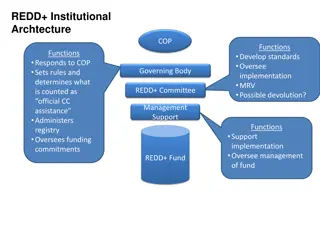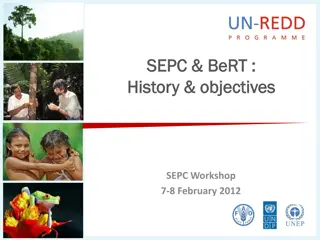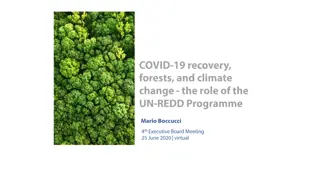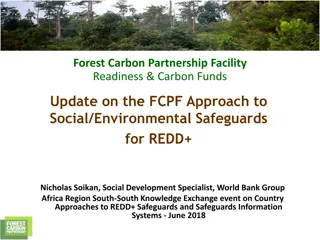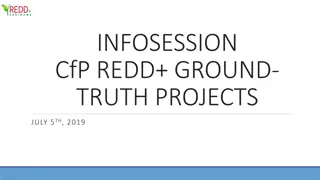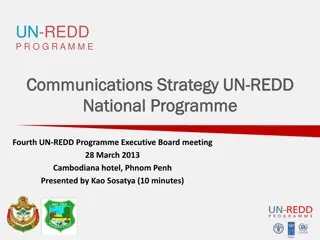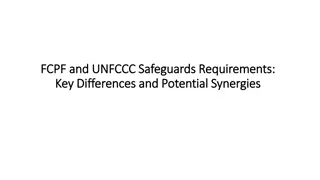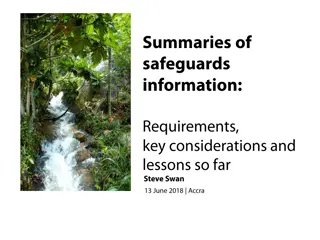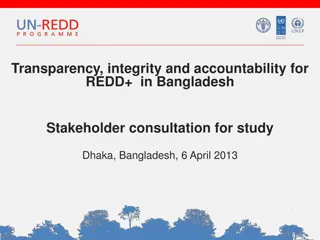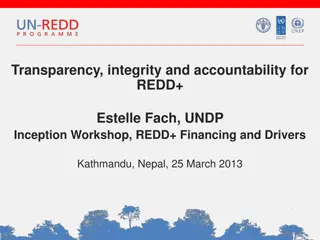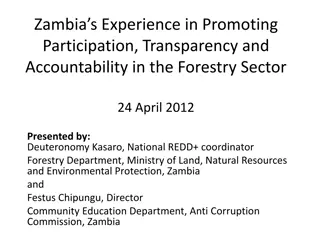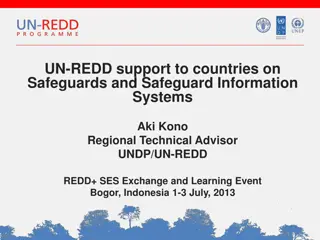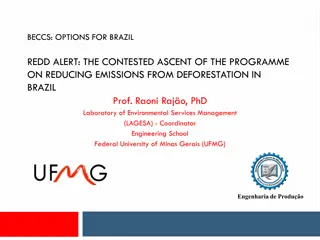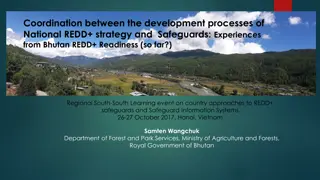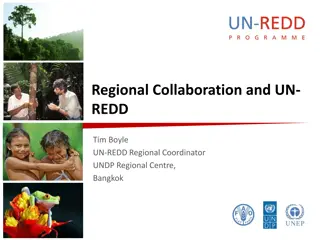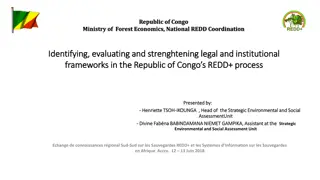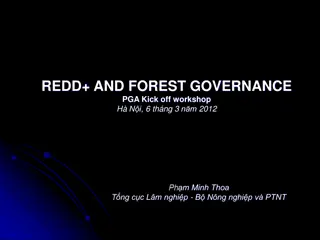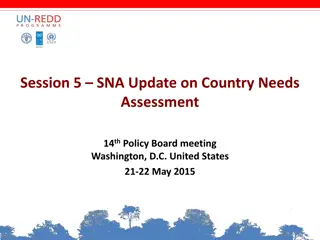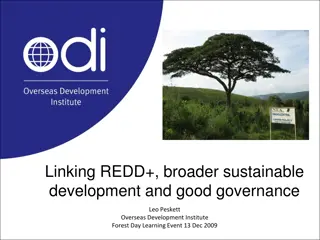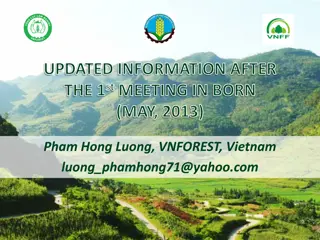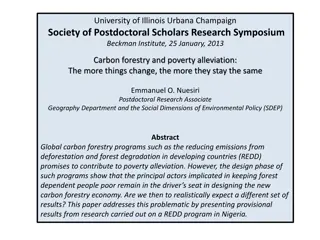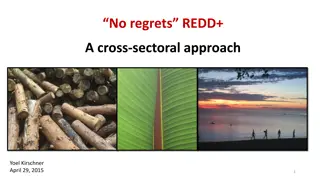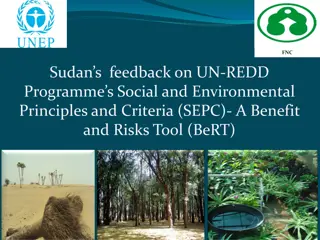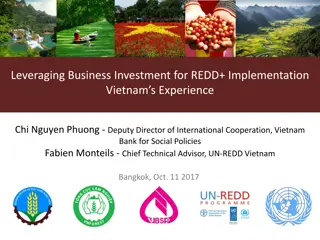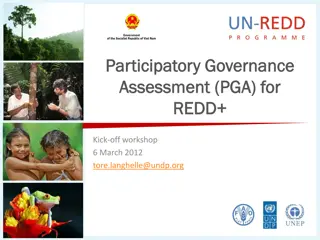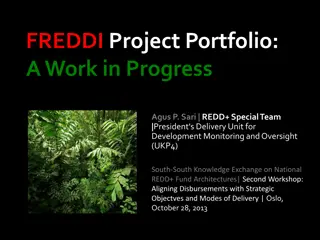Understanding Reference Emission Level in REDD
REDD (Reducing Emission from Deforestation and Forest Degradation) involves a system for producing carbon credits, including steps like setting baseline emission levels, devising deforestation reduction strategies, monitoring changes, managing carbon credit sales, and distributing income. Organizati
0 views • 10 slides
REDD+ Financing: Meeting Standards and Funding Needs
Explore the world of REDD+ financing, from accessing funds to meeting standards and securing necessary capital. Learn about the estimated extent of capital needed and projected financing needs in the quest to reduce emissions from the forest sector. Discover the role of private finance and multilate
0 views • 17 slides
Promoting Green Development Through REDD+ in Myanmar
Myanmar, with its vast forest resources, faces challenges of high deforestation rates and forest degradation. The REDD+ Programme in Myanmar aims to tackle these issues through a comprehensive strategy involving multiple stakeholders. The program focuses on sustainable forest management, community e
1 views • 9 slides
UN-REDD Programme and Safeguards: Ensuring Social and Environmental Integrity
The UN-REDD Programme focuses on supporting countries in implementing REDD+ (Reducing Emissions from Deforestation and Forest Degradation) while addressing social safeguards related to indigenous rights, stakeholder engagement, and environmental benefits. It emphasizes the importance of safeguards i
2 views • 12 slides
The Future of REDD+ Financing: Insights and Initiatives
Explore the latest developments in REDD+ financing, including commitments and initiatives by the Forest Carbon Partnership Facility and the BioCarbon Fund. Discover options available for countries seeking upfront financing and support for sustainable forest landscapes. Learn about different pathways
0 views • 6 slides
UN-REDD Webinar Series: Guidelines for Presenters & Event Promotion
Delve into the comprehensive guidelines for both presenters and event promotion for the UN-REDD webinar series. Learn how to define the purpose of your webinar, plan and promote the event effectively, and engage the audience skillfully. Discover essential tips on developing presentations, preparing
1 views • 12 slides
National Approaches to Safeguards in REDD+ Implementation
This content discusses core elements of a national approach to safeguards in the context of REDD+ implementation, highlighting key features, development processes, and tools to support safeguard initiatives. It emphasizes the importance of safeguard policies, laws, and regulations, along with the es
0 views • 14 slides
Sustainable Governance Assessment for REDD+ Implementation in Indonesia
Sustainable Governance Assessment (PGA) for REDD+ in Indonesia involves building on existing knowledge and experience, engaging stakeholders at national and local levels, forming a panel of experts, and focusing on key assessment areas such as policy quality, institutional capacity, anti-corruption
0 views • 9 slides
GCF Approach to Environmental and Social Safeguards: A Focus on GCF REDD+ Results-based Payments in Africa
The content discusses the Green Climate Fund's approach to environmental and social safeguards, specifically focusing on the REDD+ results-based payments program in the Africa region. It covers standards, due diligence roles, risk-based approaches, ESS requirements for the REDD+ pilot program, past
0 views • 13 slides
Options for REDD+ Fund Management System in Nepal
Assessing options for an effective, efficient, and equitable fund management system for REDD+ finance in Nepal is crucial as the program moves into the implementation phase. This assessment focuses on identifying and evaluating potential financing mechanisms for REDD+ in Nepal, considering various f
3 views • 14 slides
Framework for Building National Forest Monitoring Systems for REDD+
This module outlines a comprehensive framework for developing national forest monitoring systems for REDD+ initiatives. It covers key components such as satellite land monitoring, national forest inventories, greenhouse gas reporting, emission factors, and integrated monitoring systems focusing on c
0 views • 14 slides
REDD+ Institutional Architecture and Functions Overview
This content discusses the institutional architecture and functions of REDD+ (Reducing Emissions from Deforestation and Forest Degradation). It covers the role of key bodies like the COP, governing bodies, committees, and funds in developing standards, overseeing implementation, managing support fun
0 views • 5 slides
UN-REDD Programme Progress Summary 2010-2011
Significant milestones in the UN-REDD Programme's progress from November 2010 to July 2011 are highlighted, including the development of social and environmental principles, release of SEPC Version 2 for review, and engagement with diverse stakeholders and consultations. The framework aims to promot
0 views • 12 slides
Challenges and Opportunities in Implementing REDD+ for Green Recovery
This paper discusses the challenges faced in addressing climate change and forest conservation, particularly exacerbated by COVID-19, and highlights the potential business case for REDD+ in promoting green recovery. It also explores the role of UN-REDD in building a more resilient world, offering im
0 views • 7 slides
World Bank Safeguard Policies and REDD+ Implementation
This document discusses the Forest Carbon Partnership Facility (FCPF) approach to social and environmental safeguards for REDD+ programs, highlighting the integration of World Bank safeguard policies at both the readiness and implementation phases. It covers the importance of safeguard requirements,
0 views • 12 slides
Sustainable Economic Development Initiatives in Suriname through REDD+ Ground-Truth Projects
Suriname's REDD+ program aims to support economic and development goals by diversifying the economy, focusing on sectors like mining, forestry, and agriculture. The program involves various phases including readiness, implementation, and results-based activities. The country is making progress in it
0 views • 11 slides
UN-REDD Programme Communications Activities Update
In the latest update on the UN-REDD Programme, activities such as the development of communication strategies, website layout discussions, video translations, and coordination for the UN-REDD website's FPIC repository are highlighted. Key tasks include stakeholder consultations, content fill-ins, an
0 views • 6 slides
Safeguard Requirements in REDD+ Implementation: UNFCCC and FCPF Perspectives
Safeguard requirements in REDD+ projects involve various approaches and processes from entities like bilateral donors, the Green Climate Fund, project-level standards, and more. The challenge lies in integrating these multiple requirements into a coherent national approach to ensure efficiency and r
0 views • 12 slides
Progress of UN-REDD Programme in Asia: Indigenous Peoples Participation
The UN-REDD Programme in Asia has made strides in engaging Indigenous Peoples in various missions and consultations since 2008. The formulation process includes scoping, programming, validation, and approval stages, with key milestones reached in countries like Papua New Guinea, Indonesia, and Vietn
4 views • 6 slides
Requirements and Progress in REDD+ Implementation
Understand UNFCCC and GCF requirements for REDD+ implementation, including the need for national communications and summaries of information. Learn about the structure of summaries, safeguard considerations, eligibility criteria, and lessons from past experiences in developing summaries.
0 views • 9 slides
M&E for REDD+ Implementation Stocktaking - UN-REDD Asia-Pacific
In this resourceful session by Bruno Hugel from UNDP in Bangkok, key aspects of Monitoring and Evaluation (M&E) for REDD+ implementation are covered, including developing results frameworks, setting up M&E systems, leveraging existing information systems, and integrating across all sub-systems for e
0 views • 5 slides
Ensuring Governance and Integrity in REDD+ Implementation
Emphasizing the critical importance of transparency, integrity, and accountability in REDD+ initiatives in Bangladesh, this study highlights the detrimental effects of corruption on the effectiveness, efficiency, equity, and sustainability of forest conservation efforts. It identifies existing pract
0 views • 19 slides
Importance of Governance and Integrity in REDD+
Governance and integrity are crucial for the success of REDD+ to combat deforestation and forest degradation. Corruption poses serious threats by undermining effectiveness, efficiency, and equity in REDD+ initiatives. Both existing and new corruption risks must be addressed to ensure transparency, a
2 views • 9 slides
Enhancing Transparency and Accountability in Zambia's Forestry Sector
Zambia's experience in promoting participation, transparency, and accountability in the forestry sector is highlighted through initiatives like REDD+ implementation. The country's vast forest resources, including various vegetation types and significant carbon storage, pose both challenges and oppor
0 views • 13 slides
UN-REDD Support on Safeguards and Safeguard Information Systems
The UN-REDD Programme assists countries in addressing social and environmental issues through the development of national approaches to safeguards. The programme's approach emphasizes the importance of safeguarding national REDD+ systems to manage potential negative impacts and enhance benefits. Str
0 views • 12 slides
Navigating the Evolution of REDD+ Program in Brazil
The journey of REDD+ in Brazil has been marked by ups and downs as reflected in the program's contested ascent. From its promising inception to struggles with implementation, REDD+ faces challenges amidst changing stakeholder perceptions and evolving environmental policies.
1 views • 14 slides
Coordination Between National REDD+ Strategy and Safeguards in Bhutan: Experiences and Challenges
Bhutan's progress in developing its National REDD+ strategy and safeguards involves a strategic sequence of processes, engaging stakeholders, and addressing challenges such as lack of information and capacity. The coordination between the two components is crucial for successful REDD+ implementation
0 views • 8 slides
Regional Collaboration and Support in UN-REDD Program
This content showcases regional collaboration efforts and support provided by the UN-REDD program in Asia/Pacific countries. It includes activities such as facilitating information flow, exchanging experiences, developing MRV systems, and analyzing benefit distribution systems. Various initiatives l
0 views • 10 slides
Strengthening Legal and Institutional Frameworks for REDD+ in Republic of Congo
The Ministry of Forest Economics in the Republic of Congo, along with the National REDD Coordination, is actively identifying, evaluating, and strengthening the legal and institutional frameworks for the REDD+ process. Progress reports highlight the establishment of institutional arrangements, imple
0 views • 10 slides
Understanding REDD+ and Forest Governance for Sustainable Resource Management
REDD+ stands for Reducing Emissions from Deforestation and forest Degradation, encompassing activities to enhance carbon stocks, conservation, and sustainable forest management. Forest governance plays a crucial role in reducing risks related to land use change, illegal logging, and forest degradati
0 views • 11 slides
Update on Country Needs Assessment for REDD+ Readiness
The update covers the progress and objectives of the Country Needs Assessment (CNA) program, focusing on enhancing REDD+ readiness. It details the methodology, countries involved, focus areas, allocated budgets, and expected outcomes. The CNA aims to identify country needs, support leadership, impro
0 views • 15 slides
Participatory Governance Assessments in REDD+ and Global Democratic Governance Programmes
This content explores the concept of Participatory Governance Assessments (PGA) in the context of REDD+ initiatives, highlighting its objectives, value-added benefits, typical processes, and alignment with other governance indicators. It delves into examples from different countries like Indonesia,
0 views • 12 slides
Linking REDD+ with Sustainable Development Challenges and Realities
This content delves into the linkage between REDD+ initiatives and broader sustainable development, focusing on challenges and policy approaches at national and local levels. Insights on international and national connections to local livelihoods, along with institutional realities from multiple cou
0 views • 9 slides
Progress in Implementing PFES and REDD+ Initiatives in Vietnam
Pham Hong Luong from VNFOREST in Vietnam provided an update on the progress made after the 1st meeting in May 2013. The initiatives included PFES pilot implementation, readiness preparation for REDD+, PFES contract signings, fund mobilization, propaganda workshops, documentary film creation, legal d
0 views • 5 slides
Carbon Forestry and Poverty Alleviation: The Case of REDD in Nigeria
Global carbon forestry programs like REDD aim to alleviate poverty but face challenges in empowering forest-dependent communities. The paper discusses the role of key actors in maintaining the status quo, presenting research findings from a REDD program in Nigeria. Carbon forestry involves market-ba
0 views • 15 slides
Enhancing Natural Resource Management Through No-Regrets REDD+: A Cross-Sectoral Perspective
Exploring the concept of no-regrets REDD+ as a proactive approach to natural resource management, this presentation emphasizes the importance of transformational change before carbon financing. It delves into how countries leverage REDD+ for wider resource management goals, showcasing examples from
0 views • 11 slides
Feedback on UN-REDD Programme's SEPC and BeRT in Sudan
Feedback on the implementation of the UN-REDD Programme's Social and Environmental Principles and Criteria (SEPC) and the Benefit and Risks Tool (BeRT) in Sudan. The workshop aimed to identify the benefits of the SEPC tool for designing the Sudan National REDD programme, explore its usefulness on th
0 views • 15 slides
Promoting Sustainable Agricultural Practices for REDD+ Implementation in Vietnam
This presentation discusses the experience of Vietnam in leveraging business investment for REDD+ implementation. It highlights priority areas and pilot projects in agriculture commodities, plantations, timber industry, and natural forest goods and services. The focus is on integrating commodity-RED
0 views • 11 slides
Participatory Governance Assessment (PGA) for REDD+ Workshop Overview
This document provides insights into the Kick-off workshop for the Participatory Governance Assessment (PGA) for REDD+ in Vietnam. It outlines the objectives, agenda, significance of PGA for REDD+ in Vietnam, pilot phase details, stakeholder involvement, and workshop objectives. Key topics include t
0 views • 9 slides
Overview of FREDDI Project Portfolio in Indonesia
The FREDDI project portfolio in Indonesia involves the design and establishment process of the Funding Instrument for REDD+. It aims to support emissions reduction efforts, implement the REDD+ National Strategy, strengthen institutional frameworks, promote a payment-for-performance approach, and ens
0 views • 15 slides
